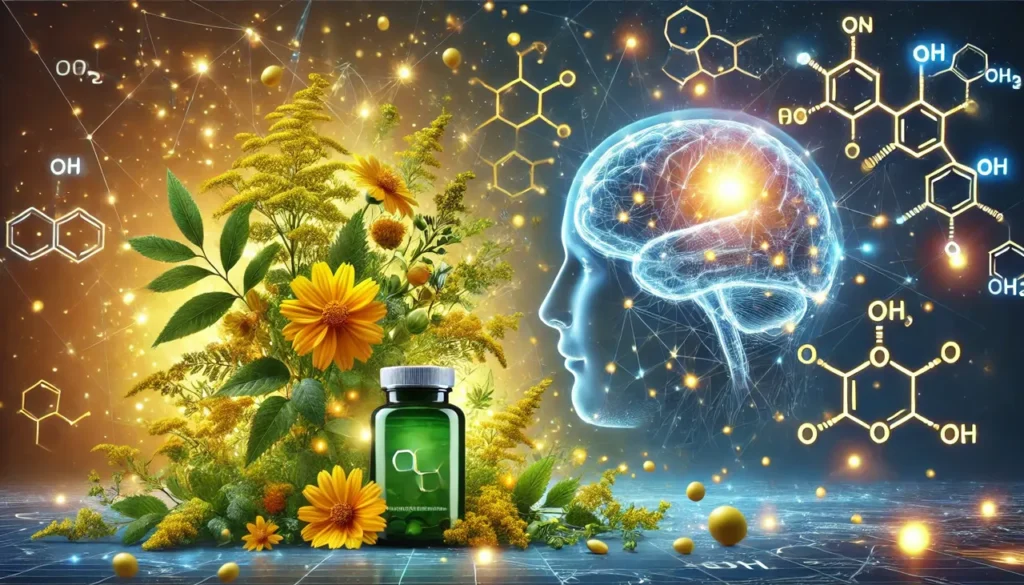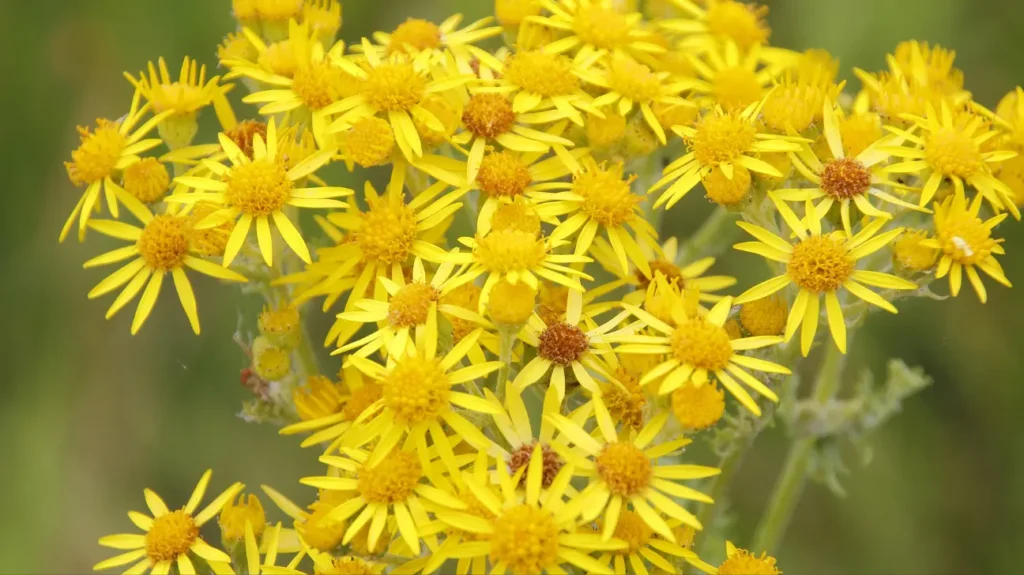Golden Ragwort, scientifically known as Packera aurea, is a perennial herbaceous plant belonging to the Asteraceae family. Native to North America, this plant has been traditionally used for its medicinal properties, particularly by indigenous peoples. Increasing interest in Golden Ragwort’s potential nootropic effects has prompted research into its active compounds and their implications for cognitive enhancement. This article delves into the chemistry, physiological mechanisms, potential nootropic benefits, dosing guidelines, side effects, drug interactions, and safety considerations surrounding Golden Ragwort as a supplement.
You May Also Like:
Sources of Golden Ragwort
Golden Ragwort is commonly found in moist, low-lying areas such as meadows, marshes, and along riverbanks. The plant flourishes in various regions across North America, from Canada to the United States, particularly in the Northeast and Midwest. The leaves and flowering tops are typically harvested for medicinal use, and the plant can be consumed in various forms, including teas, tinctures, and capsules.
Active Ingredients
The primary bioactive compounds in Golden Ragwort include flavonoids, alkaloids, and sesquiterpene lactones, all of which contribute to its medicinal properties. Of particular interest are the flavonoids quercetin and luteolin, known for their antioxidant and anti-inflammatory effects. These compounds may play a role in enhancing cognitive function and providing neuroprotective benefits.

Chemistry of Golden Ragwort
Golden Ragwort contains a variety of phytochemicals, with the most studied being its flavonoids and sesquiterpene lactones. Flavonoids, such as quercetin, are known for their ability to scavenge free radicals, reducing oxidative stress within the body. Sesquiterpene lactones, like packerine, have demonstrated anti-inflammatory and hepatoprotective effects that may indirectly support brain health.
The chemistry of these compounds facilitates their interaction with various biological pathways. For instance, quercetin can influence cellular signaling pathways associated with inflammation and apoptosis, while sesquiterpene lactones may modulate neurotransmitter systems, thereby enhancing cognitive performance and mood.

Physiological Mechanisms of Golden Ragwort in the Body and Brain
Golden Ragwort’s potential nootropic effects stem from its active ingredients and their physiological mechanisms. The primary actions of these compounds involve antioxidant activity, anti-inflammatory effects, and modulation of neurotransmitter systems, all of which contribute to enhanced cognitive function.
- Antioxidant Activity: The flavonoids present in Golden Ragwort play a significant role in mitigating oxidative stress. Oxidative stress is linked to neurodegenerative diseases and cognitive decline. By neutralizing free radicals, Golden Ragwort may help protect neurons from damage and preserve cognitive function.
- Anti-Inflammatory Effects: Chronic inflammation has been implicated in various cognitive disorders. The anti-inflammatory properties of sesquiterpene lactones in Golden Ragwort may help reduce neuroinflammation, thereby supporting brain health. By inhibiting inflammatory cytokines, these compounds can create a more favorable environment for neuronal health.
- Neurotransmitter Modulation: Preliminary research suggests that the active ingredients in Golden Ragwort may influence neurotransmitter levels. For example, quercetin has been shown to modulate the levels of serotonin and dopamine, both of which are critical for mood regulation, learning, and memory. This modulation may enhance overall cognitive performance and emotional well-being.
Manage Stress and Anxiety with Powerful Supplements for Mental Peace—Order Today on Amazon!

Nootropic Benefits of Golden Ragwort
The potential nootropic benefits of Golden Ragwort are derived from the interactions of its active ingredients with various physiological processes. While research is still limited, several areas of interest include:
- Cognitive Enhancement: Due to its antioxidant and anti-inflammatory properties, Golden Ragwort may enhance memory, focus, and overall cognitive function. By reducing oxidative stress and inflammation in the brain, Golden Ragwort may support the maintenance of neuronal integrity and synaptic plasticity—both essential for learning and memory. Furthermore, improved blood flow and oxygen delivery to the brain may also bolster cognitive abilities, facilitating better information processing. As a result, individuals might experience sharper thinking and quicker reactions in everyday tasks.
- Mood Regulation: The ability of Golden Ragwort to modulate neurotransmitter levels may also contribute to mood stabilization. Enhanced levels of serotonin and dopamine can improve mood, reduce anxiety, and increase motivation, indirectly benefiting cognitive function. Additionally, these mood-enhancing effects can promote overall emotional well-being, leading to a more positive outlook on life. This, in turn, may create a feedback loop that further enhances cognitive performance and resilience.
- Neuroprotection: The protective effects against oxidative stress and inflammation position Golden Ragwort as a potential neuroprotective agent. This characteristic may help slow the progression of cognitive decline associated with aging or neurodegenerative conditions. Moreover, by safeguarding neuronal health, Golden Ragwort could enhance the brain’s ability to recover from injuries or trauma, thus supporting long-term cognitive vitality. This neuroprotective role underscores its potential significance in preventive strategies for neurological disorders.
- Stress Resilience: Some studies suggest that the anti-inflammatory properties of Golden Ragwort may help the body cope with stress, which can otherwise impair cognitive function. By enhancing resilience to stressors, this plant may contribute to better mental clarity and performance under pressure. Furthermore, improved stress management can lead to a more balanced hormonal response, reducing the negative impacts of chronic stress on cognitive health. This capacity for stress resilience makes Golden Ragwort a valuable addition to lifestyle strategies aimed at optimizing mental performance.

Dosage and Supplementation Guidelines
While Golden Ragwort is available in various forms, including dried leaves for tea, tinctures, and capsules, standardized dosing is still being established due to the lack of extensive clinical research. However, general guidelines can be suggested based on traditional usage and available products.
- General Dosage: For cognitive enhancement and general health, a typical dosage range might range from 250 to 500 mg of dried extract daily. When taken as a tincture, dosages may range from 1 to 2 mL, depending on the concentration.
- Form of Supplementation: When considering Golden Ragwort supplements, it is advisable to choose products that provide standardized extracts to ensure consistent dosing of active compounds. Look for products that specify the content of key flavonoids and sesquiterpene lactones.
- Cycle of Use: As with many herbal supplements, cycling on and off Golden Ragwort may help prevent tolerance and maintain efficacy. A common approach is to take the supplement for four to six weeks, followed by a two-week break.

Side Effects and Safety
Golden Ragwort is generally considered safe when consumed in moderate amounts. However, potential side effects and safety considerations should be noted:
- Gastrointestinal Distress: Some individuals may experience mild gastrointestinal discomfort, including nausea or diarrhea, particularly at higher doses. It is advisable to start with a lower dosage to assess tolerance.
- Allergic Reactions: Though rare, allergic reactions to Golden Ragwort may occur. Symptoms can include rashes, itching, or swelling. Individuals with known sensitivities to plants in the Asteraceae family should exercise caution.
- Liver Function: Due to the presence of sesquiterpene lactones, individuals with liver conditions should consult a healthcare provider before using Golden Ragwort supplements, as these compounds may affect liver metabolism.
- Pregnancy and Lactation: Limited research exists on the safety of Golden Ragwort during pregnancy and lactation. As a precaution, pregnant or nursing individuals should avoid supplementation unless supervised by a healthcare professional.
Interactions with Other Supplements and Medications
Golden Ragwort may interact with other supplements and medications, necessitating caution and consultation with healthcare providers.
- Anticoagulants and Antiplatelet Drugs: Given its anti-inflammatory properties, Golden Ragwort could theoretically enhance the effects of blood thinners. Caution is advised for individuals taking medications like warfarin, as this could increase the risk of bleeding.
- Antidepressants: The potential modulation of serotonin levels raises the possibility of interactions with selective serotonin reuptake inhibitors (SSRIs) and other antidepressants. Those on such medications should consult their healthcare provider before using Golden Ragwort.
- Other Herbal Supplements: Combining Golden Ragwort with other herbal supplements, particularly those that affect the liver, may lead to unpredictable interactions. Careful monitoring is advised.
- Prescription Medications: Individuals on prescription medications should be aware of the potential for Golden Ragwort to affect liver enzymes involved in drug metabolism. This can alter the efficacy of certain medications, necessitating adjustments or monitoring.
Risks for Individuals with Certain Health Conditions
While Golden Ragwort is considered safe for most, individuals with specific health conditions may need to approach supplementation with caution.
- Liver Disease: Given the potential effects of sesquiterpene lactones on liver metabolism, individuals with liver disease should avoid Golden Ragwort unless under medical supervision.
- Gastrointestinal Disorders: Those with gastrointestinal conditions, such as irritable bowel syndrome (IBS) or inflammatory bowel disease (IBD), may experience exacerbated symptoms when using Golden Ragwort.
- Mental Health Disorders: Individuals with mood disorders or those taking medication for mental health conditions should be cautious, as Golden Ragwort’s effects on neurotransmitter levels may interfere with prescribed treatments.
Achieve Optimal Rest with Amazon’s Top Picks for Sleeping Supplements—Shop Now!
Conclusion: Should You Consider Golden Ragwort as a Nootropic?
Golden Ragwort presents a compelling case as a potential nootropic supplement, with its active compounds offering promising benefits for cognitive enhancement, mood regulation, and neuroprotection. Its antioxidant and anti-inflammatory properties contribute to the maintenance of brain health, and the modulation of neurotransmitter systems may support improved cognitive performance.
However, further research is needed to establish standardized dosing guidelines, confirm efficacy, and explore potential long-term effects. As with any supplement, consulting with a healthcare professional before beginning Golden Ragwort is essential, particularly for those with pre-existing health conditions or those taking medications that may interact with this herbal remedy.
In summary, Golden Ragwort holds potential as a nootropic supplement that may support cognitive function, resilience, and overall brain health. By maintaining awareness of its benefits, risks, and interactions, individuals can make informed decisions about its use within their wellness regimen.

References:
- Golden Ragwort. Retrieved from: https://www.rxlist.com/supplements/golden_ragwort.htm
- Packera aurea – L. Retrieved from: https://pfaf.org/user/Plant.aspx?LatinName=Packera+aurea
- Packera aurea (Golden groundsel). Retrieved from: https://www.wildflower.org/plants/result.php?id_plant=PAAU3
Important Note: The information contained in this article is for general informational purposes only, and should not be construed as health or medical advice, nor is it intended to diagnose, prevent, treat, or cure any disease or health condition. Before embarking on any diet, fitness regimen, or program of nutritional supplementation, it is advisable to consult your healthcare professional in order to determine its safety and probable efficacy in terms of your individual state of health.
Regarding Nutritional Supplements Or Other Non-Prescription Health Products: If any nutritional supplements or other non-prescription health products are mentioned in the foregoing article, any claims or statements made about them have not been evaluated by the U.S. Food and Drug Administration, and such nutritional supplements or other health products are not intended to diagnose, treat, cure, or prevent any disease.


